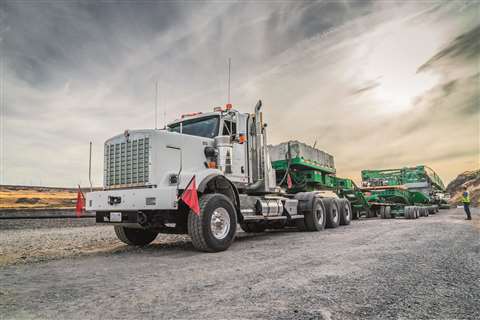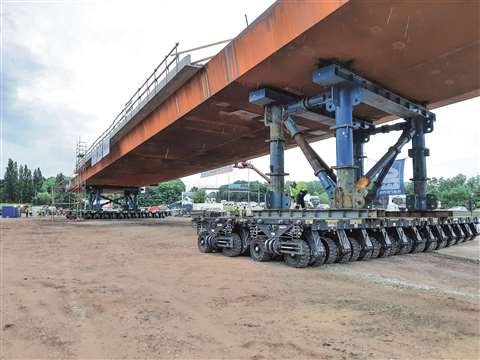What is the status of the UPT2021 initiative?
14 February 2023
When a load is transported over a long distance, there are many critical issues that haulers must face, including route, schedule, security, safety and cost, to name just a few. The biggest issue is moving from one jurisdiction to another.
 A central premise of UPT2021 is that the technology available in transportation today can and should be employed to bring efficiency and economy to the permitting process.
A central premise of UPT2021 is that the technology available in transportation today can and should be employed to bring efficiency and economy to the permitting process.
Resolving this issue has been one of the leading challenges of the SC&RA since its founding. A national effort was needed, and that finally came in 2018 with the launch of Uniform Permit Transport 2021 (UPT2021), an ambitious push to have all 50 states using compatible permits for overweight/oversize vehicle configurations by 2021. It’s been a legendary effort.
As a precursor to the initiative, SC&RA compiled information from states that allow electronic display of permits for a joint public comment response with the American Trucking Association (ATA) to a proposed rule from the Federal Motor Carrier Safety Administration (FMCSA). That rule “would permit the use of electronic methods to sign, certify, generate, exchange or maintain records so long as the documents accurately reflect the information in the record and can be used for their intended purpose.”
At SC&RA’s urging the Federal Highway Administration (FHWA) compiled and published a collection of best practices for oversize/overweight permitting. The major finding was that 24/7 auto-issue permitting is essential for the safety and efficiency of the American economy. Additionally, the SC&R Foundation helped fund the American Transportation Research Institute study, “Assessing the Cost and Operational Impacts of State Practices Granted for Overweight Permits,” which provided data pointing to the benefits of permitting harmonization.
Of course, the big road block to this initiative was the Covid-19 pandemic in early 2020. Despite the economic impact of the pandemic, many states made significant advancement towards permit automation and harmonization throughout 2020 and into 2021. Addressing the critical shortage of truck parking across the U.S., SC&RA secured wins at both the federal and many state levels. The FMCSA reissued a five-year extension of its 30-minute rest break exemption for SC&RA members, and made favorable, if not completely satisfactory improvements, to hours of service overall.
At the state level, 19 states enabled drivers the ability to either reasonably travel off their permitted routes for food, fuel or rest, or park overnight at state facilities to find rest elsewhere. Other major wins for harmonization include increases to Maryland and North Carolina super load thresholds; Arkansas extension of single trip permits to five days; and the removal of weekend travel prohibitions in Florida, Maryland, Montana and North Carolina. As well, Indiana, North Carolina, Virginia and Wisconsin debuted new automated permitting systems, while Michigan made a significant step towards auto-issue by allowing it for annual power unity permits only.
As of late 2022, while UPT2021 is still an active initiative with work yet to be done, the framework for success has been built:
- Departments of transportation in all 50 states have committed to harmonize various disparate permit policy rules and regulations.
- More than 38 states are now auto-issuing 95 percent or more of their permits.
Technology usage for UPT2021
A central premise of UPT2021 is that the technology available in transportation today can and should be employed to bring efficiency and economy to the permitting process. Technology such as on-board electronic recorders for hours of service, in-cab cameras, telematics, sensors, GPS, electronic data logging and transmission – all of these can be used to support data compilation and analysis for maintenance, safety, equipment usage and even billing and financial issues.
 Since its founding in 1947, SC&RA has been working on permitting unity and transport regulation harmony among states.
Since its founding in 1947, SC&RA has been working on permitting unity and transport regulation harmony among states.
While the primary focus of UPT2021 has been permit harmonization across the United States, SC&RA has sought the same results in Canada and Mexico in an acknowledgement that the market for haulers of overweight and oversized loads potentially is all of North America.
The Association has advocated for automation in Ontario and Quebec and harmonization in local permitting in Ontario. The Association successfully collaborated with Ontario’s new Certified Superload Escort Program, a first-of-its-kind private escort program to replace police escorts.
SC&RA also has met with several Mexican government officials to express appreciation, on behalf of its members, for the commitment to safety and efficiency demonstrated by the Mexican government with respect to administering its oversize and overweight permit program – most notably its “one-stop-shop” permit, good for one single permit to move on federal roads throughout the entire country.


